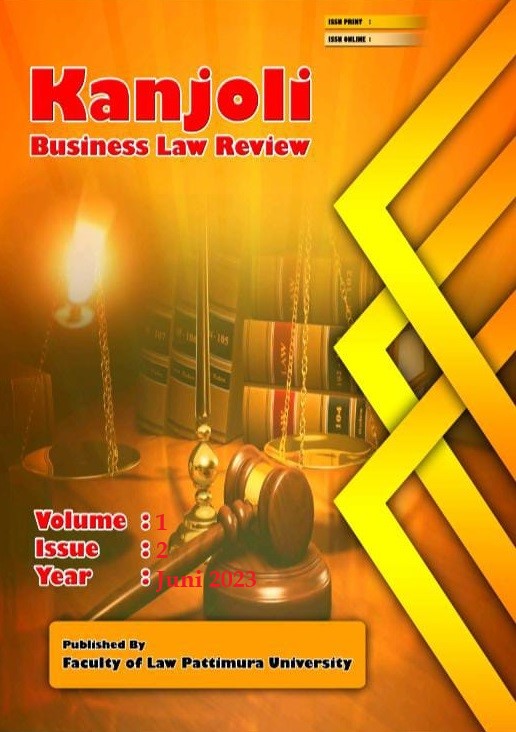Kepastian Hukum Terhadap Kendaraan Yang Didaftarkan Atas Nama Persekutuan Komanditer
Abstract
Lawful and reasonable agreement. However, registering the motorized vehicle has a legal consequence that the second party enters their capital in the form of goods, in this case the truck fleet, another problem that arises from the agreement is the consequences in the event of a loss to the company. More specifically regarding the responsibility of the Limited Partnership for motorized vehicles on behalf of the Limited Partnership where in essence the vehicle is owned by an individual. The ambiguity that arises is as if the motorized vehicle can be categorized as assets owned by the Limited Partnership so that the curator can carry out an inventory of the assets of the Limited Partnership. The research method used in this paper is normative legal research. This research is directed to be able to provide a description of the implications of legal certainty for vehicles registered on behalf of limited partnerships. Based on this description, the legal gaps in this study are: legal certainty for registered vehicles, the validity of agreements made by limited partnerships with new members, and legal consequences in the event of bankruptcy in limited partnerships for members. Legal certainty for vehicles registered on behalf of the vehicle on behalf of the Limited Partnership. Success Kencana Express and the letters used legally. The validity of the truck fleet ownership membership agreement with CV. Success Kencana Eexpress. Where the agreement is done under the hand. Article 1338 of the Civil Code states that the agreement remains in effect as the law that made it because the legal conditions for the agreement have been met. Legal consequences if there is a loss to CV. Success Kencana Eexpress is mentioned in Article 8 in the membership agreement letter for ownership of the truck fleet with CV. Kencana Abadi's Success are matters that have not been sufficiently regulated/irregular in a statement letter and membership agreement will be arranged by deliberation and consensus. In this provision it is stated that if there is something that is not explained, including parties who feel disadvantaged.
Downloads
References
Ali, Zainuddin. 2009. Metode Peneltian Hukum. Jakarta: Sinar Grafika.
Artha, Ratna Windasari. 2014. Hukum Perjanjian. Yogyakarta: Graha Ilmu.
Ashshofa, Burhan. 20013. Metode Penelitian Hukum. Jakarta: Rineka Cipta.
Badrulzaman, Mariam Darus. 1993. Kitab Undang-Undang Hukum Perdata Buku III tentang Hukum Perikatan dengan Penjelasan. Bandung: Alumni.
Badrulzaman, Mariam Darus. 2014. Kompilasi Hukum Perikatan. Bandung: Citra Aditya Bakti.
Basrah. 1981. Buku Ke-III KUH. Perdata tentang Perikatan Jual Beli dan Pembahasan Kasus. Medan: Fakultas Hukum USU.
Bruggink. 2015. Refleksi Tentang Hukum Pengertian-Pengertian Dasar dalam Teori Hukum. Bandung: PT Citra Aditya Bakti.
Dirdjosisworo, Soedjono. 2008. Misteri Dibalik Kontrak Bermasalah. Bandung: Mandar Maju.
Fuady, Munir. 2015. Hukum Kontrak (Dari Sudut Pandang Hukum Bisnis). Bandung: Citra Aditya Bakti.
Haposan, Rudy Siahaan. 2017. Hukum Perikatan Indonesia. Malang: Intelegensia Media.
H.S., Salim. 2002. Pengantar Hukum Perdata Tertulis (BW). Jakarta: Sinar Grafika.
H.S., Salim. 2013. Hukum Kontrak Teori dan Teknik Penyusunan Kontrak. Jakarta: Sinar Grafika.
Ikhsan, Edi dan Siregar, Mahmul. 2009. Metode Penelitian dan Penelitian Hukum sebagai Bahan Ajar, Medan: Fakultas Hukum Universitas Sumatera Utara.
Copyright (c) 2023 Sri Rumada Sihite

This work is licensed under a Creative Commons Attribution-NonCommercial 4.0 International License.
Authors who publish their manuscripts in this Journal agree to the following conditions:
- The copyright in each article belongs to the author, as well as the right to patent.
- Authors are able to enter into separate, additional contractual arrangements for the non-exclusive distribution of the journal's published version of the work (e.g., post it to an institutional repository or publish it in a book), with an acknowledgment of its initial publication in this journal.
- Authors are permitted and encouraged to post their work online (e.g., in institutional repositories or on their website) prior to and during the submission process, as it can lead to productive exchanges, as well as earlier and greater citation of published work.
- Authors have the right to self-archiving of the article (Author Self-Archiving Policy)











